The University Scholars Program is proud to announce our lineup of speakers for our 2015 Scholars Seminar on Leadership, Research, and Innovation. The Scholars Seminar is the first open-classroom style course designed collaboratively by students and features thought leaders and change makers from both inside and outside the university. The Scholars Seminar gives students insight into the groundbreaking work of Northeastern's innovative and distinguished faculty across the disciplines, as well as access to authors, activists, artists, and journalists who are shaping national conversations on issues of vital importance.
The Scholars Seminar features four visitors to campus, who will speak at events open to the entire Northeastern community: actress and advocate Laverne Cox; essayist and blogger Ta-Nehisi Coates; Pulitzer Prize winning journalist and filmmaker Jose Antonio Vargas; and environmental activist and author Naomi Klein. These visitors are joined by an outstanding array of Northeastern University faculty, who are undertaking innovative and consequential research in a diversity of fields.
SCHEDULE OF SPEAKERS
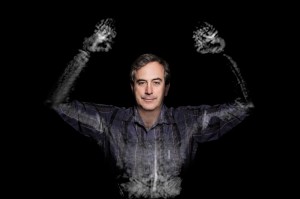
Carey Rappaport
"What Lies Beneath: Sensing and Detecting Unseen Threats," January 22
Carey Rappaport, Distinguished Professor of Electrical and Computer Engineering
Carey Rappaport serves as an Associate Director of the Bernard M. Gordon Center for Subsurface Sensing and Imaging Systems. Rappaport has been a professor at Northeastern University since 1987, mentoring scores of undergraduate researchers along the way. He received dual SBs, SM, and Eng from MIT in 1982 and the Ph.D. from MIT in 1987. Rappaport's research has focused upon developing and integrating electromagnetic, acoustic, and optical sensing technologies to detect hidden objects and to use those technologies to meet real world subsurface challenges ranging from humanitarian demining to noninvasive breast cancer detection. Professor Rappaport is also a Faculty Fellow of the University Scholars Program.
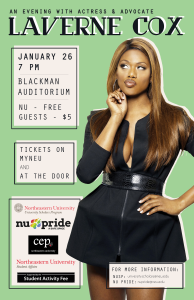
Laverne Cox
Laverne Cox, "Ain't I a Woman: My Journey to Womanhood"
January 26, 7:00 PM, Blackman Auditorium
Laverne Cox is a critically acclaimed actress who currently appears in the Netflix original series Orange is the New Black, playing the groundbreaking role of “Sophia Burset,” an incarcerated African American transgender woman. Laverne is the first trans woman of color to have a leading role on a mainstream scripted television show. Time magazine named Sophia Burset the 4th most influential fictional character of 2013.
Cox has also become a vocal and prominent advocate for moving beyond traditional gender expectations, with speaking engagements nationwide and appearances on CNN, MSNBC, ABC, NPR, HLN, VH1, and other national TV and radio networks. Laverne was named one of Out magazine’s “Out 100,” one of the country’s top 50 trans icons by The Huffington Post, and one of Metro Source magazine’s “55 People We Love.” A graduate of Marymount Manhattan College, Laverne holds a degree in Fine Arts.

Thomas Webster
"Good Things Come in Small Packages: The Future of Nanomedicine," February 5
Thomas J. Webster, Professor of Chemical Engineering
Professor Webster directs the Nanomedicine Laboratory which designs, synthesizes, and evaluates nanomaterials for various implant applications. Nanomaterials are central to the field of nanotechnology and are materials with one dimension less than 100 nm. Tissues investigated include bone, bladder, vascular, cartilage, dental, and the nervous system. Dr. Webster’s degrees are in chemical engineering from the University of Pittsburgh (B.S., 1995) and in biomedical engineering from Rensselaer Polytechnic Institute (M.S., 1997; Ph.D., 2000). He is currently the Department Chair and Professor of Chemical Engineering at Northeastern. His research explores the use of nanotechnology in numerous applications. Specifically, his research addresses the design, synthesis, and evaluation of nanophase materials (that is, materials with fundamental length scales less than 100 nm) as more effective biomedical devices.
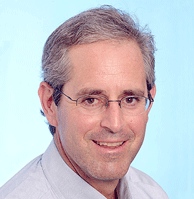
Marc Meyer
"Innovating for Success," February 12
Marc H. Meyer, Robert Shillman Professor of Entrepreneurship & Matthews Distinguished Professor
Professor Meyer is widely published in the field of product, service, and business model innovation and has worked with industry leaders in computing, industrial products, and consumer products around the world. He has also taken a leadership role in developing new methods for teaching entrepreneurship and has helped numerous students start their own ventures. Dr. Meyer is the founder of D'Amore-McKim School of Business’ Entrepreneurship and Innovation Group and Co-Director of the Center for Entrepreneurship Education, which combined education, incubation, and launch into a single, experiential learning system for undergraduate and graduate students from across the University, as well as alumni.
Professor Meyer was co-founder of VenturCom (which became Ardence and was acquired by Citrix), a leader in real-time process control and automation software. He has also been part of the startup teams for Phase2 Sotware Corporation (a distributed database applications developer), and Intervista Software (a 3D worlds developer acquired by Platinum Software), and Sentillion (single sign-on for health care, acquired by Microsoft). He has consulted in a number of industries in the area of new product strategy and platform management with companies that include IBM, Hewlett Packard, McKesson, P&G, Mars Incorporated, and BAE Systems.
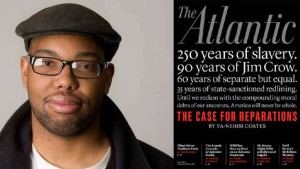
Ta-Nehisi Coates
Ta-Nehisi Coates, "The Case for Reparations"
February 19, 6:00 PM, Blackman Auditorium
A national correspondent for the Atlantic, Ta-Nehisi Coates has penned many influential articles, including a 2014 cover story on slavery and race, “The Case for Reparations,” which became one of the most talked-about pieces of nonfiction in recent memory. Last year, Coates’s lively Atlantic blog was named by Time as one of the 25 Best in the World.
Coates is a former writer for The Village Voice, and a contributor to Time, O, and The New York Times Magazine. In 2012, he was awarded the Hillman Prize for Opinion and Analysis Journalism. Judge Hendrik Hertzberg, of The New Yorker, wrote, “Coates is one of the most elegant and sharp observers of race in America. He is an upholder of universal values, a brave and compassionate writer who challenges his readers to transcend narrow self-definitions and focus on shared humanity.”
In Fall 2014, Coates will begin a new position teaching at the School of Journalism at CUNY. He was previously the Martin Luther King Visiting Associate Professor at MIT.
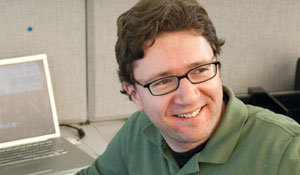
Engin Kirda
"Taming the Malicious Internet: Cybersecurity in the Age of Emerging Threats," February 26
Engin Kirda, Professor of Computer Science and Engineering
Professor Kirda's research interests are in systems, software and network security, with a focus on Web security, binary analysis, and malware detection. He directs Northeastern's Information Assurance Institute. Previously, he has worked on distributed systems, software engineering and software architectures. Before coming to Northeastern, Professor Kirda taught at Institute Eurecom (France) and the Technical University of Vienna, where he co-founded the Secure Systems Lab.
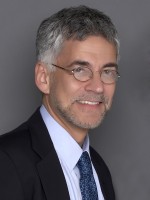
John Auerbach
"Contemporary Challenges in Public Health," March 5
John Auerbach, Professor of Practice in Health Sciences
Professor Auerbach is Director of the Institute on Urban Health Research at Northeastern.
From 2007 to 2012 he was the Massachusetts Commissioner of Public Health. As Commissioner he oversaw a Department with 3,100 employees and 100 separate programmatic units including those addressing chronic and infectious disease, substance abuse, environmental health and emergency preparedness. He initiated the Mass in Motion initiative, a multi-faceted campaign to prevent obesity and promote wellness. He was a member of the team that implemented the state’s groundbreaking health care reform initiative.
Prior to his appointment as Commissioner, Auerbach had been the Executive Director of the Boston Public Health Commission for 9 years.Under his leadership, the Commission developed new initiatives on tobacco control, cancer, asthma, obesity, emergency preparedness as well as a broad-based and comprehensive campaign to reduce racial and ethnic health disparities.
Mr. Auerbach had previously worked at the State Health Department for a decade, first as the Chief of Staff and later as an Assistant Commissioner overseeing the HIV/AIDS Bureau. He began his career in public health as an administrator in the Uphams Corner Community Health Center and a manager at Boston City Hospital and the Boston University School of Medicine.
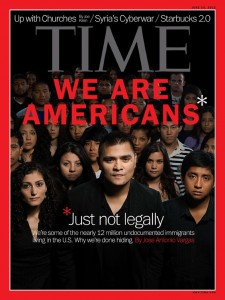
Jose Antonio Vargas
Jose Antonio Vargas, "Define American"
March 19, 6:00 PM, WVF 020
Jose Antonio Vargas is a Pulitzer Prize-winning journalist, filmmaker, and the founder of Define American, a campaign that seeks to elevate the conversation around immigration. In June 2011, the New York Times Magazine published a groundbreaking essay he wrote in which he revealed and chronicled his life in America as an undocumented immigrant, stunning media and political circles and attracting international coverage. A year later, he appeared on the cover of TIME magazine worldwide with fellow undocumented immigrants as part of a follow-up cover story he wrote. Since then, he has testified at a Senate Judiciary Committee hearing on immigration reform, and written and directed Documented, a documentary film on his undocumented experience.
As a writer for the Washington Post, Vargas shared a Pulitzer Prize for coverage of the Virginia Tech massacre. He received the 2014 Freedom to Write Award from PEN Center USA.
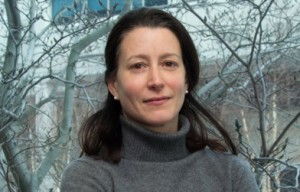
Lucy Maulsby
"Fascism, Architecture, and the Politics of Urban Space," March 26
Lucy Maulsby, Assistant Professor of Architectural History
Maulsby’s research focuses on architectural responses to modernization with a special emphasis on the relationships between architecture, urbanism, and politics in Italy. Her book Fascism, Architecture and the Claiming of Modern Milan, 1923–43 was published by the University of Toronto Press (2014). This project was funded by a number of fellowships, grants, and awards including a Whiting Fellowship and a Mellon Author Award. Her articles and reviews have been published in Urban History, Journal of Architectural Education, and in City Halls and Civic Materialism: Towards a Global History of Urban Public Space (edited by Swati Chattopadhyay and Jeremy White) and are forthcoming in Future/Anterior and The Journal of the Society of Architectural Historians. Her current book project Modernism in Postwar Italy considers the legacy of Fascism in the postwar period and has been supported by a Wolfsonian-FIU Fellowship and Franklin Research Grant.
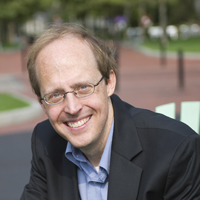
Stephen Intille
"Personal, Behavioral Health Informatics: At the Interface of Human and Machine," April 2
Stephen Intille, Associate Professor of Computer & Information Science and of Health Sciences
Stephen Intille's work explores the development and evaluation of personal, behavioral health informatics – how sensor data acquired throughout everyday life from miniature mobile and in-home sensors might be used to improve wellness via novel human-computer interfaces. This research involves merging ideas from the computer science subfields of pattern recognition, machine learning, computational sensing, and artificial intelligence with ideas from behavioral science, behavioral medicine, social psychology, and preventive medicine. Intille is particularly interested in how algorithms that recognize everyday activities can drive the development of interactive preventive health tools that could ultimately be applied at the population scale in a cost-effective manner. Intille directs the mHealth Research Group at Northeastern, which has worked to create new tools that can be used to both measure and motivate behavior change, taking advantage of emerging sensor-based technologies.
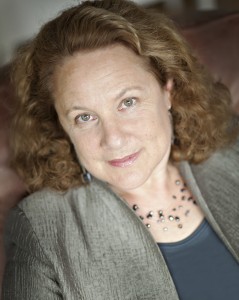
Carla Kaplan
"Miss Anne in Harlem," April 9
Carla Kaplan, Davis Distinguished Professor of American Literature
Professor Kaplan's newest book is Miss Anne in Harlem: The White Women of the Black Renaissance. Little could be more unusual in the 1920s than for white, upper-class women to seek to become, in effect, honorary blacks. Miss Anne in Harlem is the first book to tell the story of a number of spirited white women who did just that, crossing race lines viewed as impenetrable to play seminal roles in the great black cultural movement of the early twentieth century that came to be called the Harlem Renaissance. Often viewed with suspicion by people on both sides of the color line, these women were patrons and participants, friends and sometimes lovers—and frequently lightning rods for controversy as their motives for embracing blackness were misinterpreted, misrepresented, and derided. Kaplan's engrossing group biography gives these women their due, exploring the intentions, contributions, and lasting significance of six iconoclasts who left their mark on an emerging black cultural shift.
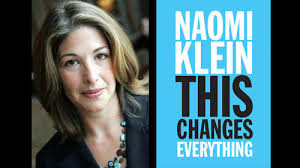
Naomi Klein
Naomi Klein, "Capitalism vs. the Climate"
April 16, 6:00 PM, Blackman Auditorium
Naomi Klein’s ambitious and provocative new book, This Changes Everything: Capitalism vs. the Climate, has inspired debate and discussion worldwide. It was called by the New York Times “a book of such ambition and consequence that it is almost unreviewable…. The most momentous and contentious environmental book since Silent Spring.”
Klein’s previous book, The Shock Doctrine: The Rise of Disaster Capitalism (2007) was published in 30 languages and has over a million copies in print. It appeared on multiple “best of year” lists, including as a New York Times Critics’ Pick of the Year.
Klein’s first book No Logo: Taking Aim at the Brand Bullies was also an international bestseller, translated into over 25 languages with more than a million copies in print. The New York Times called it “a movement bible.” In 2011, Time magazine named it as one of the Top 100 non-fiction books published since 1923.
